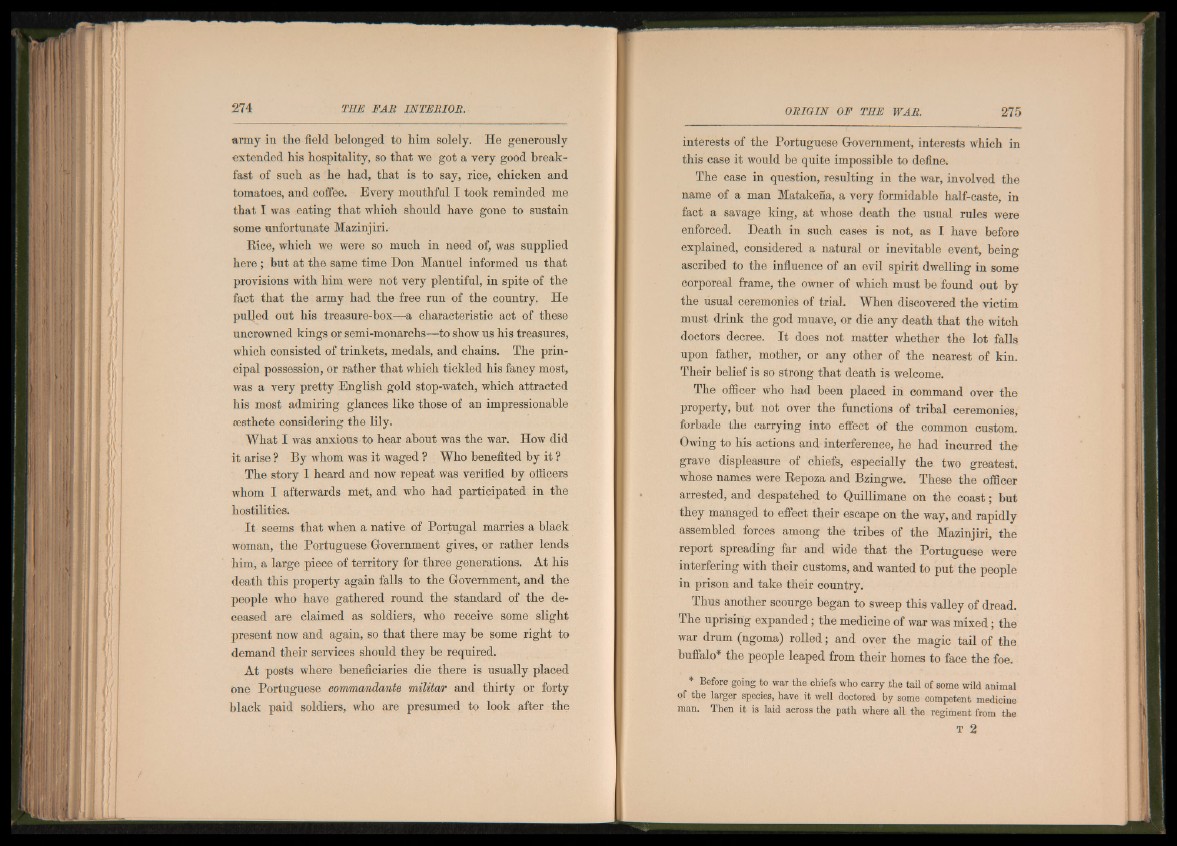
army in the field belonged to him solely. He generously
extended his hospitality, so that we got a very good breakfast
of such as he had, that is to say, rice, chicken and
tomatoes, and coffee. Every mouthful I took reminded me
that I was eating that which should have gone to sustain
some unfortunate Mazinjiri.
Riee, which we were so much in need of, was supplied
here ; but at the same time Don Manttel informed us that
provisions with him were not very plentiful, in spite of the
fact that the army had the free run of the country. He
pulled out his treasure-box—a characteristic act of these
uncrowned kings or semi-monarchs—to show us his treasures,
which consisted of trinkets, medals, and chains. The principal
possession, or rather that which tickled his fancy most,
was a very pretty English gold stop-watch, which attracted
his most admiring glances like those of an impressionable
aesthete considering the lily.
What I was anxious to hear about was the war. How did
it arise ? By whom was it waged ? Who benefited by it ?
The story I heard and now repeat was verified by officers
whom I afterwards met, and who had participated in the
hostilities.
I t seems that when a native of Portugal marries a black
woman, the Portuguese Government gives, or rather lends
him, a large piece of territory for three generations. At his
death this property again falls to the Government, and the
people who have gathered round the standard of the deceased
are claimed as soldiers, who receive some slight
present now and again, so that there may be some right to
demand their services should they be required.
At posts where beneficiaries die there is usually placed
one Portuguese commandante militar and thirty or forty
black paid soldiers, who are presumed to look after the
interests of the Portuguese Government, interests which in
this case it would be quite impossible to define.
The case in question, resulting in the war, involved the
name of a man Matakena, a very formidable half-caste, in
fact a savage king, at whose death the usual rules were
enforced. Death in such cases is not, as I have before
explained, considered a natural or inevitable event, being
ascribed to the influence of an evil spirit dwelling in some
corporeal frame, the owner of which must be found out by
the usual ceremonies of trial. When discovered the victim
must drink the god muave, or die any death that the witch
doctors decree. I t does not matter whether the lot falla
upon father, mother, or any other of the nearest of kin.
Their belief is so strong that death is welcome.
The officer who had been placed in command over the
property, but not over the functions of tribal ceremonies,
forbade the carrying into effect of the common custom.
Owing to his actions and interference, he had incurred the
grave displeasure of chiefs, especially the two greatest,
whose names were Repoza and Bzingwe. These the officer
arrested, and despatched to Quillimane on the coast; but
they managed to effect their escape on the way, and rapidly
assembled forces among the tribes of the Mazinjiri, the
report spreading far and wide that the Portuguese were
interfering with their customs, and wanted to put the people
in prison and take their country.
Thus another scourge began to sweep this valley of dread.
The uprising expanded; the medicine of war was m ixed; the
war drum (ngoma) rolled; and over the magic tail of the
buffalo* the people leaped from their homes to face the foe.
* Before going to war the chiefs who carry the tail of some wild animal
of the larger species, have it well doctored by some competent medicine
man. Then it is laid across the path where all the regiment from the
T 2